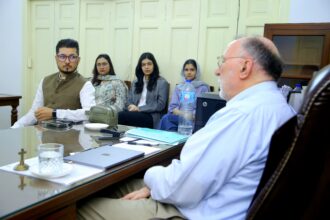You might have wondered why, even today, after 77 years of independence, Pakistanis continue to carry the psychological remnants of colonialism. Even today, the English language is seen as “superior,” light skin tone is deemed “beautiful,” and the “master-slave mentality” still persists within us.
As a nation, we have entered into an ethnocentric realm where internalized inferiority with respect to Western culture has been ingrained within us. This has contributed to the Gora Superiority Complex, where the British portrayal of themselves as more intelligent, civilized, capable, and refined may have left us in such a place of vulnerability that we struggle to exercise our own agency. An example of this may be our educational structures, which still emphasize rote learning rather than creativity.
Jung’s Collective Unconscious

How have these patterns persisted, embedding themselves into our everyday behaviors? Using the psychoanalyst Carl Jung’s theory of the collective unconscious, we might be able to decipher this phenomenon.
Jung maintains that just as humans store their experiences individually within their memory, so does humankind collectively as a species. This heritage is passed down from generation to generation. As a result, our primitive past guides our present and future behavior. However, Jung clarifies that we do not inherit such aspects directly; rather, we foster a potential for them. The chance of this predisposition turning into reality depends upon the specific experiences we encounter in our lives.
However, many structures in Pakistan—namely political, educational, and media institutions—provide constant reinforcement of colonial-era hierarchies to ensure that such behaviors persist.
Colonial Echoes in the System
With Pakistan’s bureaucratic system operating with excessive red tape and virtually no sense of accountability, it has played a significant role in reinforcing colonial culture. Instead of a foreign ruler, we now have locals as the new colonizers, further alienating people from their identity and culture.
Additionally, decision-making remains highly centralized, leaving little to no room for grassroots movements or democratic participation.
The Education System: Producing Clerks, Not Thinkers
Looking at the education system, schools continue to prioritize obedience over critical thinking, assisting bureaucratic structures in creating a new generation of stringent conformists. Moreover, with creativity and innovation not being valued, we are producing clerks in place of intellectuals, imitating what the British system once focused on.
With the glorification of Western culture embedded in the belief that true knowledge can only be attained through foreign degrees, this further strengthens our colonial mindsets.
Media & Beauty Standards: The Reinforcement of Colourism
The media has also played a role in reinforcing the colonial mindset, particularly in shaping beauty standards. With most local celebrities honing a light skin tone, an ideal of beauty has been created that revolves around fair skin.

Additionally, the promotion of products such as Fair & Lovely and beauty soaps—basing their marketing around “glowing” or “fairer” skin—has reinforced Eurocentric ideals of beauty. This has contributed to deepening psychological insecurities and alienating people from their South Asian identities.
Divide & Rule: The Lingering Effects of Sectarianism & Ethnocentrism
The infamous strategy of divide and rule has unfortunately left a permanent mark on Pakistani society. The ever-growing sectarianism and racial intolerance in the country have reinforced this colonial strategy.
With a rise in sectarian and racial divisions—such as Punjabis vs. Pathans, Muhajirs vs. locals, or religious sectarian extremism—political and social instability has increased.
Breaking Free: Embracing Our True Identity
Colonial structures are only holding us back from embracing our true identity. By glorifying Western ideals, we fail to realize that what works for them might not work for us, as our communities are vastly different from theirs.
By embracing such cultural ideals as colourism, servility, and self-censorship, we are stagnating our intellectual growth. We must reject the idea that change is impossible and work toward better embracing our own cultural and intellectual potential.
It is time to reject the colony we have set up in our minds and work toward owning our future.












